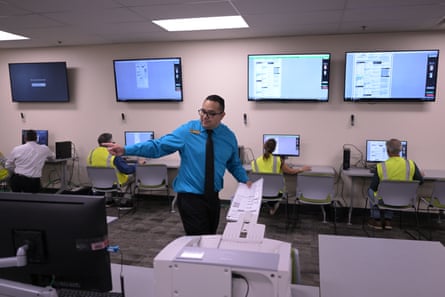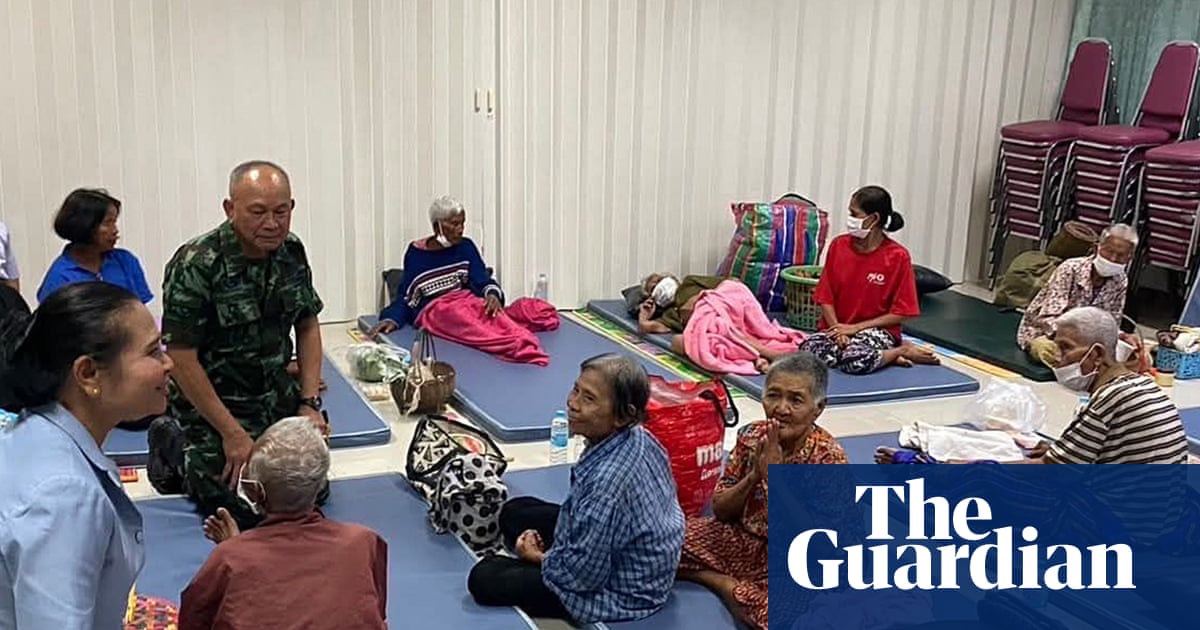Steve Schleiker, the Republican county clerk in El Paso county, Colorado, got home from work on 16 July when he got a text message from a number he didn’t recognize with a pressing request.
The person sending the message introduced himself to Schleiker as Jeff Small, a political consultant with the 76 group who had formerly served as Congresswoman Lauren Boebert’s chief of staff. He said he was working with the White House and was looking for Republican clerks in Democratic states they could partner with on election integrity. Small wanted to speak soon, Schleiker said, because there was going to be a meeting the next morning between the Department of Homeland Security and the Department of Justice.
Schleiker spoke with Small that evening, and says Small connected him with an official at the Department of Homeland Security for a follow-up conversation. The official asked if Schleiker would be willing to allow the federal government to access the county’s election equipment and see if there were any gaps in the county’s network, Schleiker said.
Schleiker was shocked by the request.
“I was an absolute no,” he said. “That is absolutely against the law, it’s a felony. And two, it also violates the constitution with states’ rights.”
At least 10 clerks in Colorado received similar queries from Small, which come as the justice department has shifted its focus from protecting voting rights to investigating voter fraud and election irregularities, and has ramped up requests for information to states about how they keep ineligible voters off the rolls.
Justin Grantham, the clerk and recorder in Fremont county, said he also received a phone call from Small asking about the possibility of a third party coming in to access voting equipment.
Small had mentioned he was working with the White House on implementing Donald Trump’s 25 March executive order on elections. A provision in the measure instructs the homeland security secretary to assess the security of voting equipment “to the extent they are connected to, or integrated into, the Internet and report on the risk of such systems being compromised through malicious software and unauthorized intrusions into the system.”

“This is the first time ever I’ve received a request of that nature,” Grantham said, adding that he told Small he didn’t believe the president could issue an executive order dealing with elections. “I’m not willing to let anybody come into my office like that.”
Matt Crane, the executive director of the Colorado county clerks association, said Small’s requests set off alarm bells. Allowing unauthorized access to voting equipment is a felony in the state. Several clerks and experts said they had never received such a request before. The requests were first reported by the Washington Post.
Crane, who consulted for the Cybersecurity and Infrastructure Security Agency (Cisa), the part of DHS that handled election security from 2019 until 2025, said he had never heard of the federal government trying to access voting machines.
“At no point would anybody from Cisa ever even ask to get hands on voting systems,” he said. “The optics are bad. If something goes wrong, people could say it was Cisa.”
Crane, who held an emergency conference call with clerks last week to discuss the outreach, said all of the officials who were contacted were Republicans using voting equipment from Dominion Voting Systems.
Bobbie Gross, the Mesa county clerk and recorder, said someone identifying themselves as Small called her office not asking about access to the machines, but with an even more unusual request. They wanted to know who the county’s project manager at Dominion was in 2020 and 2021. “This is not public information and the request was denied,” she said.
The interest in Dominion is significant. Tina Peters, the former Mesa county clerk who espoused unfounded conspiracy theory claims about Dominion, was sentenced to nine years in prison last year for tampering with election equipment after the 2020 election. Trump has called for Peters to be freed and the justice department has tried to assist with getting her case overturned. The justice department also sent Colorado a broad request for election records dating back to the 2020 election last month that some speculated is related to the Peters case. Earlier this month, a Colorado man was also arrested after allegedly throwing a molotov cocktail-type device through the window of a room that houses voting equipment at the county clerk’s office.
The request also comes as the justice department reportedly asked officials to explore whether election officials who fail to secure election equipment can be criminally charged.
Small referred a request to comment to a lawyer, Suzanne Taheri. She said in a statement that Small had reached out to counties on a volunteer basis while on paternity leave from his job at the 76 Group to assist with implementing the executive order.
“Jeff supported efforts by allies in the administration to encourage Colorado election officials to participate in President Trump’s election security executive order,” she said. “The notion that local clerks supporting the implementation of the president’s executive order is somehow inappropriate is preposterous.”
“Colorado audits voting machines all the time, under explicit procedures outlined under state and federal law. The executive order that Jeff reached out on would comply with these same laws and to suggest otherwise is dishonest.”
The Colorado secretary of state, Jena Griswold, the state’s top election official, said that defense was “completely misleading and dishonest”.
“Of course election equipment is certified, both to state and federal standards. The federal standard certification of election systems is done in a secure environment by experts. It’s not done by consultants or representatives of the federal government accessing voting equipment on the ground,” said Griswold, a Democrat. “That’s not how any of this works.”
The Department of Homeland Security distanced itself from Small.
“Jeff Small does not speak for the Department of Homeland Security. He does not have any role with DHS and has never been formally authorized to do any official business for the department,” a spokesperson for the agency said in a statement.
Crane said he had reached out to local election officials in other states, but no one else had received similar requests.
“You start to wonder, ‘is this more than verifying our systems are secure?’”

 1 day ago
4
1 day ago
4

















































